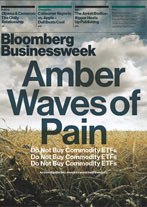 Billions of dollars are pouring into exchange-traded funds (ETFs), but it seems there is still much for investors to learn about how these funds work.
Billions of dollars are pouring into exchange-traded funds (ETFs), but it seems there is still much for investors to learn about how these funds work.
We’ve written in the past about ETF liquidity issues that hurt investors during the May 6 “flash crash,” the trading costs that can drain away real returns for investors and the impact on investors when ETFs trade at a premium or a discount to their underlying net asset value.
This week’s cover story in Bloomberg Businessweek presents another eye-opener about ETFs. The story urges readers to steer clear of commodity ETFs, calling them “America’s worst investment.”
That could be something of an overstatement, but the article does bring up good points about the risks of investing in ETFs that invest in commodity futures.
One of these risks is “contango,” which is when the future delivery contracts for a particular commodity cost more than the near-term contracts. The ETFs don’t want to take physical delivery of commodities, so they sell their futures contracts before they expire and use the proceeds to buy more futures with more distant expiration dates.
Businessweek cites a contango example for crude oil futures affecting ETFs – in May, they sold June contracts with an average price of about $76 per barrel and bought July contracts with an average price of about $80 per barrel. The upshot is that the ETFs had to pay $4 per barrel more to replace the same merchandise – this represents an immediate loss to investors.
The crude oil market is still in contango: at midday today, the near-month September contract was $78, the October contract was $78.45 and the November contract was priced at $79.14. If contango is maintained, the ETFs that buy and sell crude oil futures are likely looking at more losses ahead.
Businessweek also points out professional traders know this weakness of these commodity ETFs and make a lot of money exploiting it.
ETFs can have a place in many investment strategies, but they are still not well understood by investors and that’s a big risk. Before buying, investors need to know what they are getting into so they can make the best decisions consistent with their investment goals.
- Bulenox: Get 45% to 91% OFF ... Use Discount Code: UNO
- Risk Our Money Not Yours | Get 50% to 90% OFF ... Use Discount Code: MMBVBKSM
Disclaimer: This page contains affiliate links. If you choose to make a purchase after clicking a link, we may receive a commission at no additional cost to you. Thank you for your support!


Leave a Reply